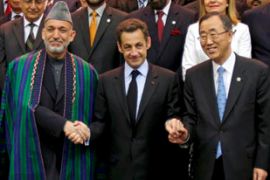Donors pledge $20bn to Afghanistan
They call for more anti-graft measures from Hamid Karzai, who had asked for $50bn.

| In video |
But the Afghan leader has come under pressure over his failing efforts to tackle corruption and opium production in his country.
Transparency International, an organisation covering corruption around the world, ranks Afghanistan as the ninth most corrupt country out of 180 surveyed.
Integrity Watch, an independent non-governmental organisation, says that 70 per cent of international funds to Afghanistan are not even channeled through the government and out of every $100 donated, only $20 reaches the people it was intended for.
| Donor pledges | ||
|
Source: Agencies |
Mohammed Douad Sultan Soy, an Afghan MP and chairman of the country’s economic committee, told Al Jazeera from the conference that funds which bypass the government “runs contrary to the democratic process which has been built in Afghanistan”.
“Corruption starts from [the] top, down and the remedy has to start from top, down too,” he said.
“Corruption is the mother of many other ills in Afghanistan at the moment, in terms of administrative weaknesses and people’s dissatisfaction.
“What the people of Afghanistan want is accountability and proper management and also transparency.
“These funds aren’t to be used on personal wish lists. The people of Afghanistan have to be the real recipients and they have to have a role in saying what should be done.
“We need to put emphasis on sectors that can produce immediate results – agriculture and road systems, for example.”
Poppy poverty
Most Afghans still live in mud-brick homes without proper sanitation and
80 per cent have no electricity, despite $15bn in international aid since the removal of the Taliban in 2001.
| “Every act of corruption is a deliberate act by someone in a position of authority” Ban Ki-moon, UN secretary general |
Life expectancy remains under 50 years, and food shortages over the past year have pushed many Afghans to the brink.
Drugs are a key part of the economy, as Afghanistan is the world’s top opium producer.
UN chief Ban urged world donors to co-ordinate and intensify their efforts to aid Afghanistan, and to insist on better governance by the Afghans.
“Every act of corruption is a deliberate act by someone in a position of
authority,” he said.
Brad Adams, Asia director of Human Rights Watch, said: “If the donors just offer more of the same and ignore the need for systemic reform, including a commitment to take on warlords and address impunity, then the situation in Afghanistan is likely to deteriorate.”
Aid pledges
Germany has already pledged €420m ($653m) to support reconstruction efforts in Afghanistan through to 2010.
Norway’s civilian aid to Afghanistan will remain at $145m a year for the next five years.
Nicolas Sarkozy, the French president, told Karzai it was “the duty of all democrats to help you,” in his opening speech.
France would “maintain its effort in Afghanistan as long as necessary”, he said.
Sarkozy said France would more than double its aid, focusing on health and agriculture, takings its contribution to $165m over the next two years.
Aid agencies in Afghanistan say France has spent around $80 million in aid since 2001, with a further $29.5m pledged but not disbursed.

